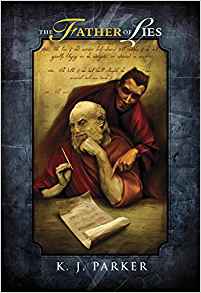Gary K. Wolfe Reviews The Father of Lies by K.J. Parker
 The Father of Lies, K.J. Parker (Subterranean 978-1-59606-852-0, $40.00, 542pp hc) January 2018.
The Father of Lies, K.J. Parker (Subterranean 978-1-59606-852-0, $40.00, 542pp hc) January 2018.
K.J. Parker’s major new collection The Father of Lies doesn’t actually contain a story by that title, but it doesn’t need to: the old trickster’s techniques run like a twisted thread through these 12 equally twisted stories and novellas (three of them published earlier by Subterranean as standalones). All but two take place in Parker’s now-familiar shadow-Europe of knights, armies, and various comically Machiavellian grifters and scoundrels. This world is detailed and consistent enough over many stories that we could probably puzzle out its history and geography, since enough quasi-historical figures, cities, tribes, and institutions recur from story to story (the philosopher Saloninus, the Oxford-like Studium, the calendar which seems to hover around the 7th century “AUC”), but Parker’s world has less in common with fantasies of cartography than it does with P.G. Wodehouse or even Thorne Smith. His first-person narrators are acutely aware of human haplessness and incompetence, including their own, and the digressive, exasperated tone in which they tell their tales fairly begs to be read aloud. But while many of Parker’s previous stories set in this world forgo supernatural or magical trappings altogether, these are loaded with gods, sorcerers, witches, demons, and even a dragon.
Old Scratch himself, or at least a designated lieutenant, even shows up in a couple of tales. “The Devil You Know” (one of the previously published standalones) is an ingenious variation on the Faust legend, with the alchemist-philosopher Saloninus (a self-confessed complete fraud in the earlier novella “Blue and Gold”) trying to outsmart a demon bureaucrat by offering to sell his soul on the usual terms – 20 years of youth and health, with the demon as an all-powerful servant during that period, after which Saloninus is to be condemned to hell. Unusually, Parker divides the narrative between two first-person viewpoints, the philosopher himself and the demon trying to figure out what the philosopher is up to. We nearly end up sympathizing with the demon, as Saloninus’s own cynicism and nihilism become more apparent through the story, but the ending is both satisfying and deeply ironic. In “Rules”, a debauched dilettante finds his deal with the devil coming due, and tries to weasel out of his fate by arguing that his own devalued soul is a bad bargain, and offering instead to arrange for the corruption of the great playwright Saturninus, roughly the alt-Europe equivalent of Shakespeare and all the other Elizabethan dramatists rolled into one.
Demons also show up in the only two stories set in a recognizable historical Europe, rather than Parker’s own alternative. Elizabethan drama also figures in one these, “Told By An Idiot”, in which a wealthy theater-owner is sold a bottle containing a demon by a notorious peddler of fake antiquities (who also offers the Book of Job in Job’s own handwriting – in Latin). Its early 17th-century historical context helps make this one of the funniest stories here, as we learn that the theater owner had both turned down Doctor Faustus and discouraged his star playwright from finishing a play “about a man who couldn’t make up his mind.” “The audience aren’t going to be interested in someone like that,” he explains in one of many Shakespearian allusions that pepper the story. In the other “real history” tale, “No Peace for the Wicked”, Satan even manages to instill a disastrously corrupt Pope, the real-life Theophylact, in order to insure centuries of chaos, though in this story Parker lets his waggish philosophical debates – the main issue here being that evil is good, since it’s part of God’s creation – run on a bit too long for the good of the story.
Of the four major novellas here, the only one not previously published as a standalone is “The Things We Do for Love” (although it did appear in an issue of Subterranean), a wild screwball comedy about a corrupt aristocrat who marries a witch and, with her magical help, amasses such an enormous fortune that he can’t figure out what to do with it. But when he tries to escape the marriage, either by murdering her or even by committing suicide, she manages to resurrect each of them. “The Downfall of the Gods” features Parker’s lone female narrator, a petulant goddess (ironically describing herself as the goddess of charm) who flouts tradition by refusing to absolve a murderous aristocrat because his victim was her favorite singer; the resulting kerfuffle, involving an Orpheus-like journey to the underworld, eventually brings about the downfall of the title. “The Last Witness” is constructed around what’s perhaps the most intriguing fantasy conceit in the collection: the narrator can, for a hefty fee, selectively remove memories from others – although those memories then become his own. It’s an idea with all sorts of permutations, and Parker seems so enamored of it that much of the tale involves the narrator recounting his earlier assignments before getting to the main narrative, in which he comes up against a young girl who seems to have similar powers.
Of the remaining short stories, three involve sorcerers: “I Met a Man Who Wasn’t There”, “Safe House”, and “Heaven Thunders the Truth”. The latter is the most substantial, as the youthful narrator is dispatched, along with his magical mind-reading snake, to track down the king’s nephew and thus a potentially threatening heir to the throne – only to learn that the nephew is himself. In “Message in a Bottle”, the narrator is faced with the puzzle of whether to open a sealed bottle left behind by a legendary scholar, which may contain a cure for the plague which has been ravaging the land, or possibly a more virulent form of the plague itself. It’s the neatest philosophical puzzle in the book. Finally, “The Dragonslayer of Merebarton” features yet another reluctant hero, an aging knight called forth to slay a dragon threatening a village, even though he’s convinced dragons don’t actually exist. Like most of Parker’s narrators, he’s “a man aware of his obligations, and at least some of his many shortcomings.” The motley band he assembles to go fight the dragon results in a delightfully cynical parody of the sort of quest-fantasy procedural that seems so far removed from Parker’s own unique brand of philosophical comedy.
Gary K. Wolfe is Emeritus Professor of Humanities at Roosevelt University and a reviewer for Locus magazine since 1991. His reviews have been collected in Soundings (BSFA Award 2006; Hugo nominee), Bearings (Hugo nominee 2011), and Sightings (2011), and his Evaporating Genres: Essays on Fantastic Literature (Wesleyan) received the Locus Award in 2012. Earlier books include The Known and the Unknown: The Iconography of Science Fiction (Eaton Award, 1981), Harlan Ellison: The Edge of Forever (with Ellen Weil, 2002), and David Lindsay (1982). For the Library of America, he edited American Science Fiction: Nine Classic Novels of the 1950s in 2012, with a similar set for the 1960s forthcoming. He has received the Pilgrim Award from the Science Fiction Research Association, the Distinguished Scholarship Award from the International Association for the Fantastic in the Arts, and a Special World Fantasy Award for criticism. His 24-lecture series How Great Science Fiction Works appeared from The Great Courses in 2016. He has received six Hugo nominations, two for his reviews collections and four for The Coode Street Podcast, which he has co-hosted with Jonathan Strahan for more than 300 episodes. He lives in Chicago.
This review and more like it in the January 2018 issue of Locus.





